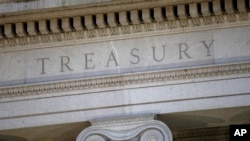The U.S. Treasury Department imposed sanctions Wednesday against two people and their Russia-based companies it accused of supporting a Kremlin-directed disinformation campaign involving the impersonation of legitimate news websites.
The sanctions targeted Moscow-based company Social Design Agency and its founder, Ilya Andreevich Gambashidze, as well as the Russian-based Company Group Structura and its owner, Nikolai Aleksandrovich Tupikin, according to a statement from the Treasury Department.
On behalf of the Russian government, they handled a network of more than 60 websites that mimicked media organizations and used fake social media accounts to amplify their content, the statement said.
"The fake websites appeared to have been built to carefully mimic the appearance of legitimate news websites," the Treasury Department said.
"The fake websites included embedded images and working links to legitimate sites."
The sanctions come amid heightened tensions between Washington and Moscow over Russia's full-scale invasion of Ukraine, now in its third year.
The United States has repeatedly accused Moscow of orchestrating what it calls global "malign influence campaigns" aimed at sowing instability in democratic countries.
Last October, a U.S. intelligence report said Russia was using its spy network, state-run media and social media to undermine public trust in elections around the world.
The United States shared the report with some 100 countries.
"We are committed to exposing Russia's extensive campaigns of government-directed deception, which are intended to mislead voters and undermine trust in democratic institutions in the United States and around the world," Brian E. Nelson, under-secretary of the Treasury for terrorism and financial intelligence, was quoted as saying in Wednesday's statement.
U.S.-based disinformation researchers say hundreds of sites mimicking news outlets — powered by artificial intelligence — have cropped up in recent months, fueling an explosion of false narratives, about subjects ranging from war to politicians.
That includes several Russian-linked websites mimicking news outlets and pushing Kremlin propaganda ahead of the U.S. presidential election in November, according to researchers at Clemson University and the watchdog organization NewsGuard.




